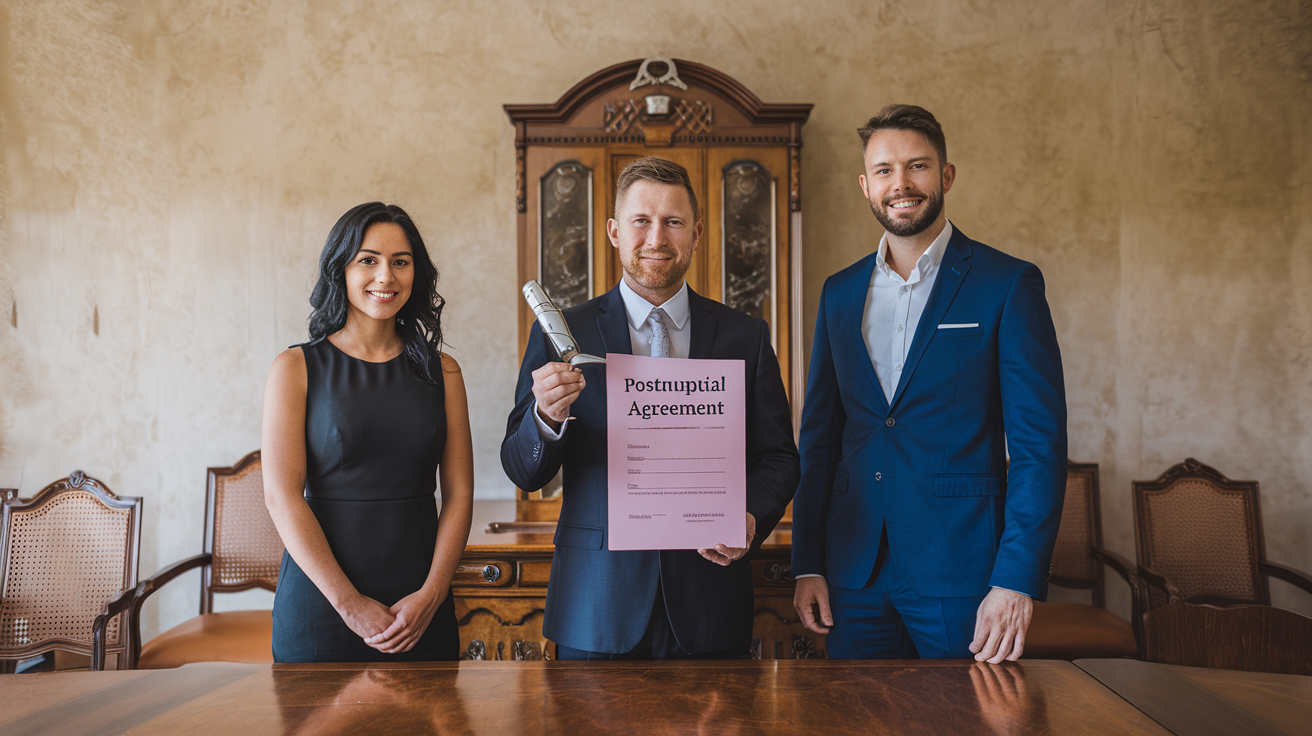You’re married and thinking about your financial future together.
Like many couples, you might not have considered a prenuptial agreement before saying, “I do.” But now you’re wondering if it’s too late to put something in writing about your shared assets and finances.
The best part is that you can still create a legal agreement after marriage. It’s called a postnuptial agreement, and it helps both partners feel secure about their financial arrangements.
So, this article will explain
- what a postnuptial agreement is,
- when you can get one,
- and why many couples choose this option.
Here, you understand the Key steps to create a valid agreement that works for both partners.
Understanding Postnuptial Agreement Work?
A postnuptial agreement is a legal contract between spouses that outlines how they’ll handle money and property if they separate or if one partner dies.
Both partners must share complete details about their money, property, and debts when making the agreement. Hidden assets can make the contract invalid later.
The agreement needs to be in writing and signed by both spouses. Each person should have their own lawyer review it before signing.
You can change how you’ll split property, handle debt, or provide support that’s different from what state laws say. But both partners must agree.
Each state has different rules about what you can put in your agreement. A local lawyer can help you follow your state’s laws.
How Long Can You Get a Postnuptial Agreement?

1. Getting Started with the Agreement
Most couples think about postnuptial agreements when they face big money changes. You can start this process any time after your wedding day.
The best time is when both partners want to talk openly about money matters. You’ll need honest talks about what you own and owe.
Working with lawyers helps make sure your agreement follows state laws. Each partner should have their own lawyer to protect their interests.
2. Time to Complete the Process
Making a postnuptial agreement usually takes between two to four months. This gives everyone enough time to review all details carefully.
Your lawyers will help gather information about your assets and debts. They make sure everything is listed correctly in the papers.
Both partners need time to think about the terms and suggest changes. Rushing through this process isn’t good for anyone involved.
3. Important Timing Factors
Different states have different rules about when you can make these agreements. It’s smart to check what your state allows first.
Some couples wait until after their first year of marriage. This shows the court they weren’t pressured into making the agreement.
Major life events like having children or buying a property often spark interest in these agreements. They help protect everyone’s future.
4. Making it Legal
For the agreement to work, both partners must sign it willingly. No one should feel forced or rushed into signing anything.
Each partner needs their own lawyer to explain what the agreement means. This helps prove that both people understood what they signed.
Courts look at whether the timing was fair. Making an agreement during tough times might make it less likely to hold up.
Factors Affecting the Timing of Postnuptial Agreement

The right time to create a postnuptial agreement depends on several personal, financial, and legal factors.
Life Changes and Financial Events
- Starting a new business requires financial planning.
- Gifts or inheritances may prompt a discussion on separate property.
- A better-paying job can change the family’s financial setup.
Relationship
- Settling into marriage can lead to better financial talks.
- Trust helps make fair decisions about the future.
- Open money discussions build understanding and honesty.
Legal Requirements
- Each state has specific rules for agreements.
- Courts consider the length of marriage when reviewing agreements.
- Both partners need time to review finances for fairness.
Personal Readiness
- You’re ready when both want to discuss money openly.
- Clear goals make the process smoother.
- Understanding your rights helps you make better choices.
Legal Considerations for a Postnuptial Agreement

To make sure your postnuptial agreement holds up in court, there are key legal points you and your spouse need to follow.
- Clear Written Agreement: Each partner needs their own copy of the agreement in writing. All terms must be easy to read and understand.
- Full Money Details: List all your money, belongings, and bills you owe. Nothing can be hidden or left out.
- Fair and Clear Process: Each person should have their own lawyer. This ensures the agreement is fair.
- State Law Rules: Different states have different rules for agreements. Know your local laws. Some states require specific forms or words.
- Regular Updates: Review your agreement when big changes happen. Make sure it still works for both of you.
- Court Standards: Courts want to see that both partners get a fair deal. They check if anyone was forced to sign.
How much does a postnuptial agreement cost?
| Service Level & Features | Cost Range | What You Get | Tips to Save |
|---|---|---|---|
| Basic Package | $1,000 – $2,500 | Simple legal document One lawyer meeting Standard terms Basic asset list |
Gather paperwork first Agree on main points Save $300-500 |
| Standard Package | $2,500 – $5,000 | Full asset review Two lawyer meetings Property details Multiple drafts Notary fees |
Plan early Use package deals Save $500-800 |
| Full-Service Package | $5,000 – $10,000+ | Complex assets Business details Multiple properties Special conditions Regular meetings |
Get organized first Bundle services Save $1,000+ |
| Extra Costs to Consider | Varies | Each lawyer ($200-500/hour) Asset checking ($300-1,500) Papers and filing ($500-1,000) Notary ($50-100) |
Clear communication Avoid rush fees Save time in meetings |
Remember: Each state has different rules and fees. These prices are averages, and your local costs might be different. Always ask lawyers about their exact fees before starting.
Benefits of Signing a Postnuptial Agreement Early vs. Later

Early Signing and Later Signing each have their own benefits:
Benefits of Early Signing
- You start your financial talks when stress is low and both partners feel good about planning together.
- Both partners still remember what they brought into the marriage, making it easier to list assets correctly.
- There’s less chance that big life changes have made things complicated, so the agreement stays simple.
- You can think clearly about what you both want without outside pressure or immediate worries.
- Starting early shows you care about protecting each other’s future from the beginning.
Benefits of Later Signing
- You know more about how marriage affects your money and what needs protecting.
- Your financial picture is clearer after living together and sharing expenses for a while.
- You can see how your career and money have grown since getting married.
- You might better understand what could go wrong and what to put in writing.
- Your agreement can include things you didn’t think about when you first married.
Drawbacks or Challenges of Postnuptial Agreements

These are a few challenges and drawbacks that you might face during postnuptial agreements:
- Getting an agreement after marriage might make your partner feel you don’t trust them. This can strain your relationship at times.
- Both partners need their own lawyers. This means paying two legal fees, which adds up to more money spent.
- You must share all the details about your money and property. Some people feel uncomfortable showing everything about their finances.
- Some states have strict rules about these agreements. Your agreement might not work if you don’t follow every rule carefully.
- One partner might feel pressured to sign. This could cause problems later if they prove they didn’t really want to agree.
Conclusion
A postnuptial agreement helps protect both partners’ interests at any point in your marriage. You can create one that fits your needs, whether you’re newly married or have been together for years.
The key is to be open with each other and get the right legal help. While costs vary from $1,000 to $10,000+, think of it as an investment in your shared future.
Ready to take the next step? Talk to your partner about your financial goals and concerns.
Then, contact a family law attorney who can guide you through the process. They’ll help ensure your agreement meets all legal requirements and truly works for both of you.








